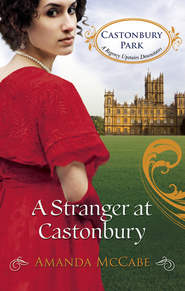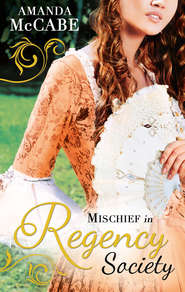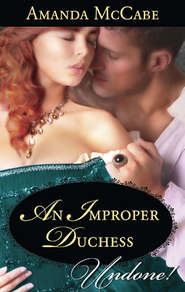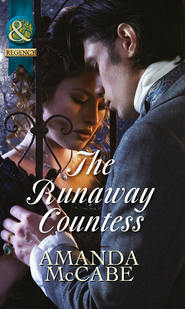По всем вопросам обращайтесь на: info@litportal.ru
(©) 2003-2025.
✖
A Notorious Woman
Настройки чтения
Размер шрифта
Высота строк
Поля
For all that, though, there was something—something enchanted about her. She carried mystery and sadness about her like a second velvet cloak, something palpable and so alluring.
Marc could never resist a mystery, a complication. It was his great downfall in life. Yet he would never have thought her to be Ermano’s sort of woman. There was not an ounce of giggling, golden softness about her. Just darkness, and hidden daggers.
No, not Ermano’s sort. But very much Marc’s.
Perhaps this task would be more enjoyable than he had ever anticipated. Enjoyable—until he had to destroy her. Very regrettable, indeed.
Chapter Three
Julietta set the last bottle into place on the gleaming shelf, balancing on her tiptoes atop a footstool to examine the array of sparkling glass, ethereal ivory, luminous onyx. Most of her patrons brought their own vials to be filled with their choice of scent, but a few liked to buy new containers and were willing to pay a great deal for the finest quality. This shipment, newly arrived from France, should do very nicely.
Julietta tilted her head to one side. “What do you think, Bianca?” she said. “Is the display enticing enough?”
Bianca left off polishing the long marble counter and came to scrutinise the sparkling bottles. She was typical of her people, the Turkish nomads, small, thin, dark, barely coming up to Julietta’s waist when she perched on the footstool as now. But she had been as steadfast a friend as Julietta could wish for, ever since those bleak days when she fled Milan for the masks of Venice.
“Very fine, madonna,” Bianca pronounced with a grin, reaching up to flick her rag at the shelf. “And certain to bring us a very handsome profit, now that they have arrived at long last.”
“Sì, now that the Barbary pirates are driven away,” Julietta answered. The pirates had plagued Venetian shipping for many months earlier in the year, harrying the trade convoys with their shipments of spices, silks, wine, sugar—and jewelled perfume vials. Julietta had missed her lavender from France, her white roses from England and the more exotic blooms and spices from Egypt and Spain. Then, the pirates were destroyed, in a tale so filled with adventure and danger it stirred even Julietta’s rusty, unpoetic soul. The salas of Venice were buzzing with nothing but stories of Il leone, the brave sea captain who destroyed the wicked pirates and saved the sacred shipping of La Serenissima. Bianca herself, after seeing his triumphant arrival in Venice last week, had talked of nothing else.
“If I was a skilled poet, Bianca, I would write an epic about Il leone,” Julietta said lightly. She stepped down from the stool, brushing her hands on the linen apron covering her black-and-white gown. “It would make us a great fortune. Troubadors would vie to recite it, to set it to music and to play it in all the great salas!”
“You have a fortune, madonna,” Bianca protested. Though she laughed, her dark, round little face wrinkled in puzzlement. And well might she be puzzled—Julietta rarely succumbed to whimsy at all, she was far too busy, far too cautious for that. After the night they had just passed at Palazzo Landucci, whimsy seemed even further away than usual.
Yet somehow—ah, somehow the daylight made things seem rather different. Even the city, so deserted, so haunted in the mists before dawn, was transformed by the pale winter sunlight, by thoughts of dashing sea captains and wicked pirates. In the small campi, people hurried by, intent on their morning errands. Laughter and jests rang out, blending with the everpresent bells of San Felice. Soon, very soon, it would be Carnival, the most profitable time of year for the shop. And, early that morning, after a mere two hours of fitful sleep, she had heard mass at San Felice, asking absolution of the night’s sins.
If only absolution could mean perpetual concealment, as well. And if only Count Ermano did not make an appearance today. She had had quite enough of drama and danger without the count’s ever-pressing attentions.
“You are right, Bianca,” she said. “We do have a fortune, so the world will never be inflicted with my poor poetic skills. I must still be giddy from lack of sleep.”
Bianca nodded slowly. “Of course, madonna. You should rest, go back to your bed for a few hours.”
“No, no. It is almost time for us to open. Perhaps I will have a siesta at midday. Now, would you fetch some of the essence of chamomile from the storeroom? I will finish mixing Signora Mercanti’s tincture.”
Bianca nodded and hurried away, her brightly striped skirts swishing over the freshly swept tile floor. As the store-room door clicked shut behind her, Julietta went back to tidying before they opened.
There was not a great deal to do—the shop was always kept immaculate, for fear dust or dirt could contaminate the sweet wares, wares Julietta spent hours blending and preparing. Every vial, every jar and pot and amphora, contained the toil of her own hands, the products of her own careful study. And the ladies of Venice, courtesan and patrician wife alike, flocked to buy them, to beg her to mix a magical scent for them alone.
Julietta stepped away from the counter, her back to the blue-painted door as she examined her little kingdom. It was small, true, yet it was all her own, from the mosaic tiles of the floor to the white plastered ceiling. It was the only thing she had ever had for herself, the only thing she had ever loved. And the small room, hidden in the corner behind its secret panel—that was most especially hers.
She reached out for a small bottle on the counter, a blue glass vial studded with silver and tiny sapphires that had strayed from one of her careful displays. She held it to her nose and smelled jasmine and lily.
Jasmine and lily. Hurriedly, she replaced the bottle, which was meant for Cosima Landucci, back on the counter, but the heady sweetness of it clung to her fingers, reminding her of her night’s work. As she stepped back, she caught a glimpse of herself in the gilt-framed mirror hung behind the counter. Her hair was still neatly braided and coiled about her head, covered by a black lace veil. Her black-and-white gown, touched only by a hint of scarlet in the ribbons of her sleeves, was as neat and quietly elegant as ever after she removed her apron. But her face—her face was as pale as a phantom.
Or a witch.
The bell on the door jangled, announcing their first patron of the day. Julietta took a deep breath of sweetly perfumed air, trying to will colour into her cheeks, and painted a bright smile on her lips before turning to greet the newcomer. “Buon giorno! Welcome to…”
But the polite words faded from her tongue when she came face to face with her patron. This was not a golden-haired courtesan or a veiled matron here in search of a special perfume or lotion, or something else, something darker, something poured secretly beneath the counter. This was a man. And what a man, indeed.
He was tall, with powerful shoulders outlined by a fine doublet of dark red velvet, closely cut and unadorned by lace or embroidery. A shirt of creamcoloured silk, soft and with the sheen of springtime clouds, peeked through the jagged slashings of the sleeves and the silk closures at the front of the doublet, rising up to a small frill framing a strong, sun-browned throat, a vee of smooth bronze chest.
Julietta’s gaze moved inexorably, unwillingly, downwards to plain black hose and Spanish leather shoes buckled with shining gold. No elaborate codpieces shaped like a conch shell or a gondola to display and enhance his masculine equipment, no gaudy striped hose. No popinjay, him. Yet not a man unaccustomed to luxury, either. Her regard slid back upwards, past the narrow hips, the powerful shoulders, the muscled chest. His face was cast half in shadow by the brim of his red velvet cap, but she could see the large, blood-coloured ruby clasped in that cap, the teardrop pearl that dangled from his left earlobe. No—not unaccustomed to luxury at all.
Glossy, dark brown hair, streaked with the gold of the sun, fell in thick waves from beneath the cap, brushing his shoulders. And his lower face could be glimpsed, a strong jaw, close shaven, darkened by the sun, set off by the glistening white of the pearl. Not a soft merchant, then, or a banker who spent his days softly indoors. Not a churchman, assuredly, yet not a poor sailor or shipmaker from the Arsenal.
A man of power, certainly, of wealth and fine looks. Not a man who drenched himself in cologne, either; Julietta’s sensitive nose told her that, even across the length of the shop. He smelled only of fresh, salty air, faintly lemony, clean. What would such a man need from her shop?
Ah, yes—of course. A gift for a lady. And here she stood, staring at him like a lackwit, gawking at his shoulders and chest and lovely hair as some alleyway putta would.
Julietta straightened herself to her full height, reaching up to check the fall of her veil. “Buon giorno, signor,” she said again, dropping a small curtsy.
“Buon giorno, madonna,” he answered. His voice was deeper than she expected, rougher, with the hint of some strange foreign accent. Not a Venetian, then. “I feared you would not yet be open for custom.”
“We are always open for such eager patrons, signor,” Julietta said, touching the tip of her tongue to suddenly dry lips. There was something strange about this man’s voice, something that seemed to reach out and wrap itself around her with misty, enticing caresses. Something about his scent…
Could he be a sorcerer? A magician from foreign lands?
Do not be a fool, Julietta! she told herself sternly. He is a man, like any other.
A man who could be a very profitable customer, to judge by the ruby and the pearl, the fine velvet, if she did not drive him away with her gapings and gawkings. Julietta stepped even farther away from him, back behind the safety of the counter.
“And what can we assist you with today, signor?” she asked briskly. The pierced bronze brazier set on the tiled floor was warm now; she added small sticks of scented wood to the coals, filling the cool air with the smell of white roses. “Our selection of fine scents is unparalleled in all of Venice.”
He moved closer to the counter, the short red velvet cape swung over his shoulders by a thin gold cord falling back to reveal sable lining, rich and soft. The bars of light from the windows fell across him, illuminating him like a stained-glass saint as he swept off his cap and lightly brushed aside the waves of his hair.
Julietta’s lips, so dry, turned numb at the sight of his eyes. They were blue—nay, not blue, turquoise, like the waters of the Mediterranean, pure and bright, startling in that sun-browned skin. Piercing. All-seeing.
A sorcerer, indeed.
Il diavolo.
Her fingers tightened on the scented sticks still in her hand, and she felt splinters pierce the skin. With a soft cry, she turned to fling them into the brazier. Turned away from those eyes.
“That is what I have heard, madonna,” the man said. She sensed him leaning lightly against the counter, watching her closely.
“Heard?” she muttered stupidly. Sì—she was behaving stupidly all round. She was a grown woman, a widow, a shop owner. She should not be unsettled by anyone.
Nay! I am not afraid, she thought fiercely. She swung around to face him fully, her head high.
A small smile played about his lips, lips as finely formed as the rest of him, full and sensual. He was younger than she would have thought; only the faintest of lines creased the edges of those sorcerer’s eyes, lined his slightly crooked nose. Who was she to be made so nervous by such a young man, no matter how rich, no matter how fine?
“I had heard that this is the finest perfumerie in Venice,” he said easily, “and that I must pay a call here.”
“I am flattered, signor.” Julietta moved slowly to the very edge of the counter, resting her hands flat on the cool marble surface, near the soft velvet of his sleeve. His body emanated warmth, and again she had that odd sense of unseen fingers reaching out to wrap around her, entice her. Yet she did not move away. “And what is it I may assist you with today? A gift for some lovely lady? No woman can resist a sweet scent blended only for her. In a jewelled bottle, perhaps? A pretty token of admiration.”
His smile widened, and he leaned his elbows on the counter until he looked up into her face, beguiling and gorgeous. “Alas, I am a newcomer to Venice, and have not yet found the lovely lady who would accept my tokens of admiration. But I do seek a gift, for a very special woman, indeed.”
Julietta felt her brow wrinkle in puzzlement. “A woman not of Venice?”











